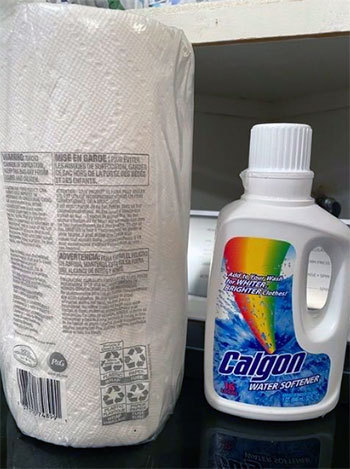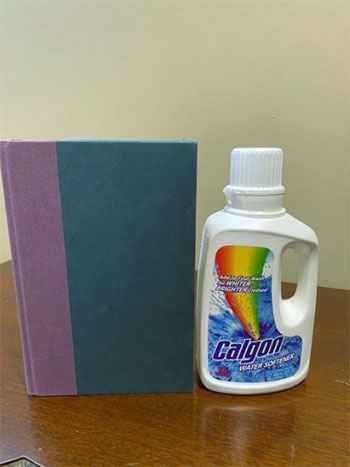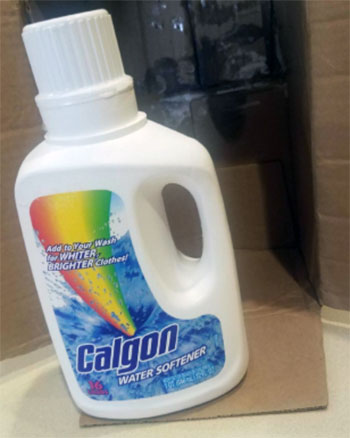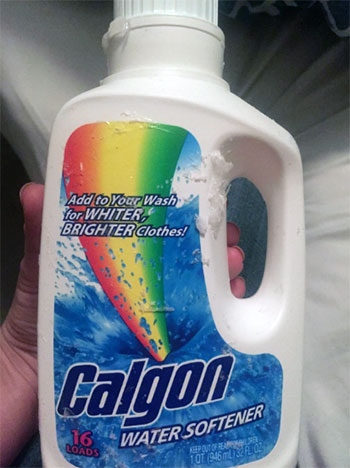If you’re battling hard water stains or residue on your dishes and clothes, Calgon Water Softener might just be the solution you need.
I’ve been using it in my home, and it’s been a game-changer for tackling those pesky mineral deposits that make laundry and dishwashing a chore.
This affordable, easy-to-use product promises cleaner results and less wear on your appliances, and I’m here to share why it’s worth adding to your routine.
In this review, I’ll walk you through my experience, break down the pros and cons, share maintenance tips, and compare Calgon to other brands—all in a conversational, real-user perspective.
Trust me, if you’re tired of hard water woes, you’ll want to give Calgon a try.
My Experience With Calgon Water Softener
Living in an area with hard water, I’d grown accustomed to the frustration of spotty dishes and stiff laundry. My washing machine seemed to be working overtime, and my clothes never felt as soft as I wanted.
That’s when I stumbled across Calgon Water Softener in the laundry aisle of my local store. The white bottle with its signature blue label and rainbow design caught my eye, and at around six bucks for a product promising softer water and cleaner results, I figured it was worth a shot.

The first time I used Calgon, I added it to my washing machine as directed—just a capful alongside my regular detergent. I was skeptical, to be honest.
Could a simple additive really make a difference? But after the first load, I noticed my towels came out noticeably softer, without that scratchy texture I’d come to accept.
My dark clothes looked brighter, too, as if the mineral buildup that dulled them had been washed away.
I tried it in my dishwasher next, hoping it would tackle the cloudy film on my glasses. Sure enough, my dishes came out sparkling, with no lingering spots or streaks.
What surprised me most was how easy it was to incorporate Calgon into my routine.
There’s no complicated setup or installation like with whole-home water softeners—just measure, pour, and let it work its magic.
Over the next few weeks, I used it consistently in both my washer and dishwasher.
The results held up, and I even noticed my appliances seemed to run a bit smoother, likely because Calgon was reducing the mineral buildup that can clog pipes and reduce efficiency.
That said, it wasn’t all perfect. The bottle’s design could use some work; I had a minor spill when the cap didn’t close tightly, which was a hassle to clean up. Also, while Calgon worked wonders for laundry and dishes, it didn’t address the broader hard water issues in my home, like limescale on faucets or dry skin after showers.
I realized it’s a targeted solution, not a whole-home fix. Still, for the price and ease of use, it became a staple in my cleaning routine. I felt like I was finally winning the battle against hard water, one load at a time.
Read More: My Thoughts On Flagship Water Filtration System
Pros Of Calgon Water Softener
Calgon’s strengths lie in its simplicity and effectiveness for specific tasks. Here’s why I think it’s a solid choice for anyone dealing with hard water:
- Affordable price point: At roughly six dollars for a bottle that handles about 16 loads, Calgon is a budget-friendly way to combat hard water issues without investing in an expensive whole-home system. It’s a small investment for noticeable results.
- Easy to use: You don’t need to be a tech wizard to use Calgon. Just measure the recommended amount, add it to your washer or dishwasher, and let it do its job. It integrates seamlessly into your existing routine.
- Effective for laundry and dishes: Calgon delivers on its promise of softer, cleaner clothes and spot-free dishes. My towels feel fluffier, and my glassware looks pristine, which is a big win in my book.
- Reduces appliance wear: By minimizing mineral buildup, Calgon helps extend the life of your washing machine and dishwasher. The Water Quality Research Foundation notes that hard water can cut appliance lifespans by up to three years, so this is a real benefit.
- Widely available: You can find Calgon at most major retailers like Walmart or Target, making it convenient to pick up during your regular shopping trips. No need to hunt down specialty stores.
These benefits make Calgon a practical choice for anyone looking to improve their laundry and dishwashing results without breaking the bank. It’s not a cure-all, but it tackles specific hard water problems effectively.
Cons Of Calgon Water Softener

While Calgon has plenty of upsides, it’s not without its flaws. Here are some drawbacks I encountered:
- Limited scope: Calgon only works in your washer or dishwasher—it doesn’t soften water throughout your home. If you’re dealing with limescale on faucets or hard water affecting your skin, you’ll need a more comprehensive solution.
- Bottle design issues: The packaging can be a bit flimsy. I had a bottle leak because the cap didn’t seal properly, which was messy and wasteful. Others online have mentioned similar issues, so handle with care.
- Ongoing cost: While Calgon is cheap per bottle, the cost adds up if you’re using it for every load. For heavy laundry households, this could become less economical over time compared to a one-time investment in a whole-home system.
- Not a permanent fix: Calgon is a band-aid solution. It treats the symptoms of hard water in your appliances but doesn’t address the root cause, like a whole-home softener would.
- Environmental concerns: Some users worry about the environmental impact of chemical additives like Calgon. If eco-friendliness is a priority, you might want to explore salt-free or natural alternatives.
These cons don’t make Calgon a bad product, but they’re worth considering if you’re looking for a long-term or whole-home solution. For me, the convenience and results outweighed these drawbacks, but your needs might differ.
Maintenance Tips For Calgon Water Softener

To get the most out of Calgon, a little care goes a long way. Here’s how I keep it working effectively and avoid any headaches:
- Store properly to avoid leaks: After my spill incident, I learned to store the bottle upright in a cool, dry place. Double-check the cap is tightly closed to prevent leaks, and consider placing it in a plastic container for extra security.
- Measure accurately: Using too much Calgon can be wasteful, while too little might not give you the results you want. Follow the bottle’s instructions—usually one capful per load—and use the provided measuring cap for precision.
- Clean appliances regularly: Calgon helps reduce mineral buildup, but it’s still smart to run a cleaning cycle on your washer or dishwasher every few months. I use a vinegar rinse in my dishwasher to keep it in top shape alongside Calgon.
- Check water hardness: If you’re not seeing results, your water might be harder than average. Test your water’s hardness with a kit from a hardware store to ensure Calgon is the right fit, or if you need a stronger solution.
- Rotate with other products: To avoid over-reliance on Calgon, I sometimes alternate with other additives like baking soda for laundry. This keeps my routine versatile and helps me gauge what works best for my water.
These steps have helped me maximize Calgon’s benefits while minimizing waste and mess. Regular maintenance ensures your appliances stay protected and your results stay consistent.
Comparison With Other Brands

Calgon isn’t the only player in the water softening game, so I compared it to a few other options to see how it stacks up. Here’s how it fares against some popular alternatives:
Whirlpool Water Softeners
Whirlpool offers whole-home water softeners, like the WHES40E, which I looked into for a more permanent solution. Unlike Calgon, Whirlpool systems use an ion-exchange process to soften all the water in your home, tackling everything from limescale on faucets to dry skin. I found the WHES40E easy to install with professional help, and its 40,000-grain capacity suits small to medium households. However, it’s a significant investment—hundreds of dollars upfront plus ongoing salt refills, which can cost around $100 annually. Calgon, by contrast, is far cheaper and requires no installation, but it can’t match Whirlpool’s comprehensive approach. If you want a whole-home fix, Whirlpool is superior, but for targeted appliance use, Calgon’s simplicity wins.
Aquasure Serene Salt-Free Conditioner
The Aquasure Serene is a salt-free water conditioner, which I considered for its eco-friendly appeal. It doesn’t soften water through ion exchange but prevents mineral buildup by altering the water’s structure. I liked that it requires no salt or chemicals, making it greener than Calgon. However, it’s pricier—around $350—and didn’t deliver the same noticeable softness in laundry as Calgon did. It’s also less effective for dishwashers, where Calgon shines. If environmental impact is your priority, Aquasure is a strong contender, but for immediate, budget-friendly results, Calgon has the edge.
Morton Water Softener Pellets
Morton’s pellets are designed for whole-home softeners, not as an additive like Calgon. I explored this option when researching systems to pair with my appliances. Morton pellets work in traditional softeners to remove minerals, offering a broader solution than Calgon’s appliance-specific approach. The downside? You need a softener system already installed, which can cost thousands, and maintenance involves lugging heavy salt bags. Calgon requires no such setup, making it more accessible for renters or those not ready for a big investment. Morton’s better for long-term, whole-home softening, but Calgon’s ease of use is unmatched for quick fixes.
Each brand serves a different purpose. Calgon’s niche is affordability and targeted effectiveness, while others offer more comprehensive but costly solutions. Your choice depends on whether you want a quick fix or a full-home overhaul.
Read More: My Thoughts On Waterboss Proplus 380
Frequently Asked Questions (FAQ)
Yes, Calgon works well for its intended purpose. I found it effective at reducing mineral buildup in my washer and dishwasher, resulting in softer laundry and spot-free dishes. It’s not a whole-home solution, but for appliance-specific use, it delivers noticeable results. Online reviews often praise its performance, with many users reporting cleaner clothes and dishes, though some mention inconsistent results with very hard water.
Choosing the best brand depends on your needs. For whole-home systems, Whirlpool stands out for its reliability and NSF certification. Aquasure is great for eco-conscious users seeking salt-free options. Morton is a trusted name for traditional softener systems. Calgon, while not a system, excels as an affordable, easy-to-use additive. I’d pick Calgon for quick fixes and Whirlpool for a comprehensive solution, but your budget and water hardness should guide your decision.
Calgon is a brand under Reckitt Benckiser, a British multinational company. While the product is manufactured in various locations, its origins trace back to the United States, where it was first developed for consumer use. You’ll find it widely available in North America, but its parent company’s global reach means it’s distributed worldwide.
Calgon offers a few formulations, but the liquid water softener I used is the most popular for household laundry and dishwashing. There’s also a powdered version, which some prefer for its concentrated formula, but I found the liquid easier to measure and use. The liquid version gets the most consistent five-star reviews online for its versatility and effectiveness, making it my go-to choice.
Conclusion: For Calgon Water Softener
If hard water is making your laundry stiff or your dishes spotty, Calgon Water Softener is a simple, affordable fix you’ll want to try. I’ve seen it transform my cleaning routine, and its ease of use makes it a no-brainer for busy households. While it’s not a whole-home solution, its targeted effectiveness and low cost make it a must-have. Give Calgon a shot—you’ll likely be as impressed as I was with the results.
